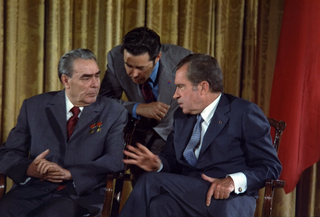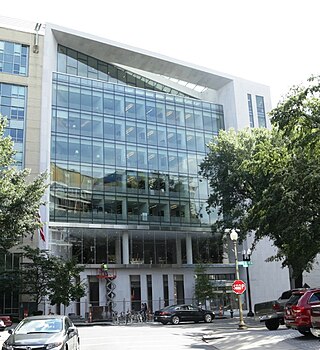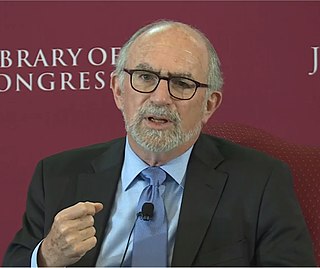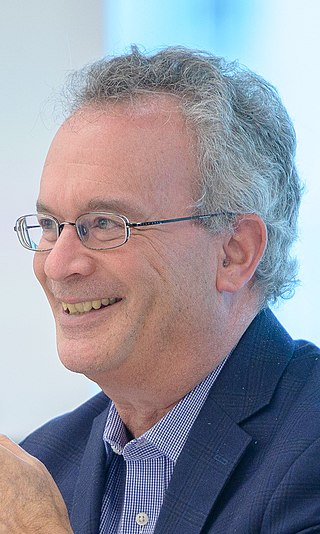Related Research Articles

Henry Alfred Kissinger was an American diplomat, political scientist, geopolitical consultant, and politician who served as the United States secretary of state and national security advisor in the presidential administrations of Richard Nixon and Gerald Ford between 1969 and 1977.
Realpolitik is the approach of conducting diplomatic or political policies based primarily on considerations of given circumstances and factors, rather than strictly following ideological, moral, or ethical premises. In this respect, it shares aspects of its philosophical approach with those of realism and pragmatism. It is often simply referred to as pragmatism in politics, e.g. "pursuing pragmatic policies" or "realistic policies".

The Trilateral Commission is a nongovernmental international organization aimed at fostering closer cooperation between Japan, Western Europe and North America. It was founded in July 1973 principally by American banker and philanthropist David Rockefeller, an internationalist who sought to address the challenges posed by the growing economic and political interdependence between the U.S. and its allies in North America, Western Europe, and Japan.
Geopolitics is the study of the effects of Earth's geography on politics and international relations. While geopolitics usually refers to countries and relations between them, it may also focus on two other kinds of states: de facto independent states with limited international recognition and relations between sub-national geopolitical entities, such as the federated states that make up a federation, confederation, or a quasi-federal system.
Diplomatic history deals with the history of international relations between states. Diplomatic history can be different from international relations in that the former can concern itself with the foreign policy of one state while the latter deals with relations between two or more states. Diplomatic history tends to be more concerned with the history of diplomacy, but international relations concern more with current events and creating a model intended to shed explanatory light on international politics.

The Council on Foreign Relations (CFR) is an American think tank specializing in U.S. foreign policy and international relations. Founded in 1921, it is an independent and nonpartisan nonprofit organization. CFR is based in New York City, with an additional office in Washington, D.C. Its membership has included senior politicians, numerous secretaries of state, CIA directors, bankers, lawyers, professors, corporate directors and CEOs, and senior media figures.

Détente is the relaxation of strained relations, especially political ones, through verbal communication. The diplomacy term originates from around 1912, when France and Germany tried unsuccessfully to reduce tensions.

The Center for Strategic and International Studies (CSIS) is an American think tank based in Washington, D.C. From its founding in 1962 until 1987, it was an affiliate of Georgetown University, initially named the Center for Strategic and International Studies of Georgetown University. The center conducts policy studies and strategic analyses of political, economic and security issues throughout the world, with a focus on issues concerning international relations, trade, technology, finance, energy and geostrategy.
Aaron Louis Friedberg is an American political scientist. He served from 2003 to 2005 in the office of the Vice President of the United States as deputy assistant for national-security affairs and director of policy planning.

Diplomacy is a 1994 book written by former United States National Security Advisor and Secretary of State Henry Kissinger.

Graham Tillett Allison Jr. is an American political scientist and the Douglas Dillon Professor of Government at the John F. Kennedy School of Government at Harvard University. He is known for his contributions in the late 1960s and early 1970s to the bureaucratic analysis of decision making, especially during times of crisis. His book Remaking Foreign Policy: The Organizational Connection, co-written with Peter Szanton, was published in 1976 and influenced the foreign policy of the Carter administration. Since the 1970s, Allison has also been a leading analyst of U.S. national security and defense policy, with a special interest in nuclear weapons and terrorism.

Today, Germany and the United States are close and strong allies. In the mid and late 19th century, millions of Germans migrated to farms and industrial jobs in the United States, especially in the Midwest. Later, the two nations fought each other in World War I (1917–1918) and World War II (1941–1945). After 1945 the U.S., with the United Kingdom and France, occupied Western Germany and built a demilitarized democratic society. West Germany achieved independence in 1949. It joined NATO in 1955, with the caveat that its security policy and military development would remain closely tied to that of France, the UK and the United States. While West Germany was becoming a Western Bloc state closely integrated with the U.S. and NATO, East Germany became an Eastern Bloc satellite state closely tied to the Soviet Union and the Warsaw Pact. After communist rule ended in Eastern Europe amid the Revolutions of 1989 and the fall of the Berlin Wall, Germany was reunified and the allied powers subsequently restored full sovereignty to Germany with the Treaty on the Final Settlement with Respect to Germany. The reunified Federal Republic of Germany became a full member of the European Union, NATO and one of the closest allies of the United States. Since 2022 Germany has been working with NATO and the European Union to give aid to Ukraine in the ongoing Russian invasion of Ukraine. In the process Germany is sharply reducing its dependence on Russian oil and gas. Germany has the third-largest economy in the world, after the U.S. and China. Today, both the countries enjoy a "special relationship".

Bruce W. Jentleson is a professor of public policy and political science at Duke University, where he served from 2000 to 2005 as Director of the Terry Sanford Institute of Public Policy. He previously was a professor at the University of California, Davis and Director of the UC Davis Washington Center. In addition to his academic career, he has served in a number of foreign policy positions in Democratic administrations.
This bibliography of Richard Nixon includes publications by Richard Nixon, the 37th president of the United States, and books and scholarly articles about him and his policies.

Helmut Sonnenfeldt, also known as Hal Sonnenfeldt, was an American foreign policy expert. He was known as Kissinger’s Kissinger for his philosophical affinity with and influence on Henry A. Kissinger, the architect of American foreign policy in the Nixon and Ford administrations.

Melvyn Paul Leffler is an American historian and educator, currently Edward Stettinius Professor of History at the University of Virginia. He is the winner of numerous awards, including the Bancroft Prize for his book A Preponderance of Power: National Security, the Truman Administration and the Cold War, and the American Historical Association’s George Louis Beer Prize for his book For the Soul of Mankind: The United States, the Soviet Union, and the Cold War.
Jussi M. Hanhimäki is a Finnish historian, specializing in the history of the Cold War, American foreign policy, transatlantic relations, international organizations and refugees.

James M. Goldgeier is a professor of international relations at the School of International Service at American University in Washington, D.C., where he served as dean from 2011 to 2017.
In political science, triangular diplomacy is a foreign policy of the United States, developed during the Vietnam War (1955–1975) by Henry Kissinger, as a means to manage relations between the contesting communist powers, the Soviet Union and China. Connecting heavily with the correlating policy of linkage, the policy was intended to exploit the ongoing rivalry between the two Communist powers, as a means to strengthen American hegemony and diplomatic interest.
Janne E. Nolan was an American academic, foreign policy advisor, and expert on nuclear arms control and nonproliferation. She held senior positions in the Department of State, as a staffer for the Senate, and served on multiple blue ribbon commissions. She was well known for supporting generations of women in the traditionally male dominated field of nuclear security.
References
- ↑ "Klaus Larres" . Retrieved August 11, 2017.
- ↑ rsc. "Klaus W. Larres". rondelisc.org. Retrieved 2024-03-25.
- ↑ "Klaus Larres Named Henry Alfred Kissinger Scholar in Foreign Policy and International Relations". Library of Congress, Washington, D.C. 20540 USA. Retrieved 2024-03-25.
- ↑ "Klaus W. Larres". unc.edu. Retrieved December 11, 2016.
- ↑ "Larres, Klaus". worldcat.org. Retrieved December 11, 2016.
- ↑ "Bio CV". klauslarres.com. Retrieved December 11, 2016.
- ↑ rsc. "Klaus W. Larres". rondelisc.org. Retrieved 2024-03-25.
- ↑ "Bio CV". klauslarres.academia.edu. Retrieved October 4, 2017.